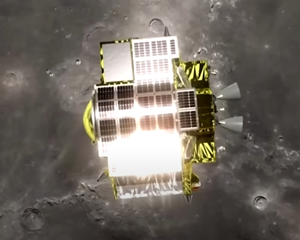Japan has become the fifth country to put a spacecraft on the moon, but power issues are threatening to cut the mission short.
日本已成为世界上第五个将航天器送上月球的国家,但电力问题可能会导致此次任务提前结束。
Japan's Smart Lander for Investigating Moon, known as SLIM, landed at 12:20 a.m. local time, but the probe's solar panels were not able to generate electricity.
日本的月球勘测智能着陆器(SLIM)于当地时间0时20分着陆,但该探测器的太阳能电池板无法发电。
That's according to the Japan Aerospace Exploration Agency -- or JAXA.
这一数据来自日本宇宙航空研究开发机构(JAXA)。
Dubbed the "moon sniper," SLIM attempted to land within 100 meters, or 328 feet, of its target versus the conventional accuracy of several kilometers.
被称为“月球狙击手”的SLIM,试图在距离目标100米(328英尺)的范围内着陆,而传统的着陆精度为几千米。
JAXA says the technology will become a powerful tool in future exploration of hilly moon poles seen as a potential source of oxygen, fuel and water.
JAXA透露,这项高精度着陆将成为未来探索多丘陵的月球极地的有力工具,而月球极地被视为氧气、燃料和水的潜在来源。

It will take up to a month to verify whether SLIM achieved its high-precision goals, JAXA said.
JAXA称,他们需要一个月的时间来验证SLIM是否达到了其高精度着陆的目标。
Japan is increasingly looking to play a bigger role in space exploration.
日本越来越希望在太空探索中发挥更大的作用。
The country is home to several private-sector space startups and JAXA aims to send an astronaut to the moon with NASA's Artemis program in the next few years.
该国是几家私营太空初创企业的所在地,而JAXA的目标是在未来几年内与美国宇航局的阿尔忒弥斯计划一起将宇航员送上月球。
But there have been recent setbacks in rocket development, including the launch failure of its new flagship H3 rocket last March.
但他们最近在火箭研发方面出现了挫折,其中就包括在去年3月,其新旗舰H3火箭的发射失败。
Only four nations -- the former Soviet Union, the U.S., China and recently India -- and no private company -- have achieved a soft landing on the moon's surface.
目前只有四个国家--前苏联、美国、中国和最近的印度(并且没有一家私营企业)--实现了在月球表面的软着陆。


